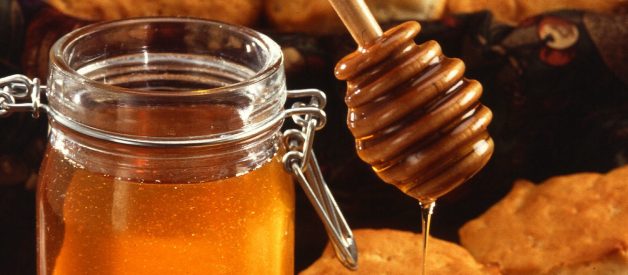Turns out that the honey question is even stickier than I initially realized
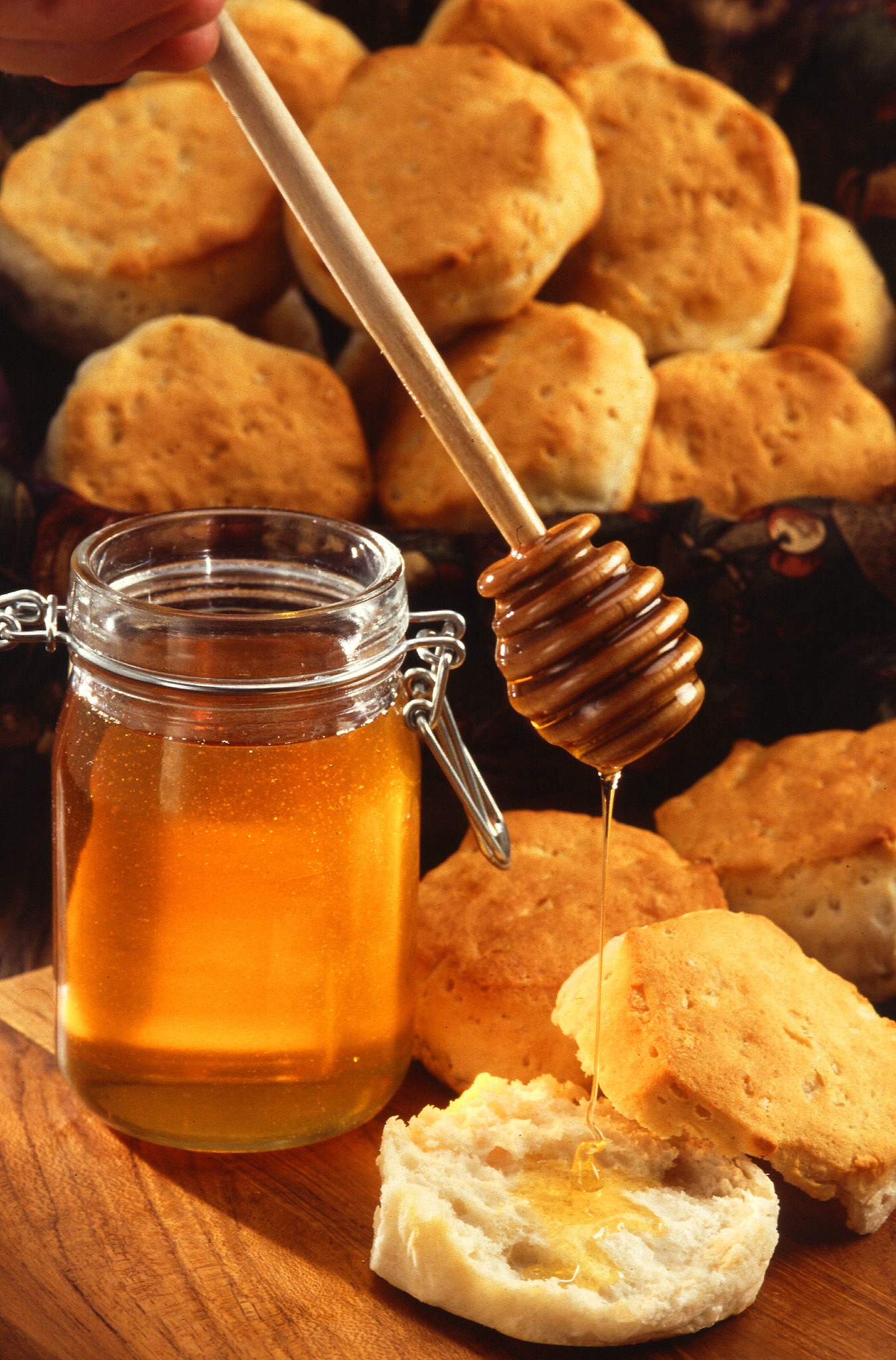 Honey, U.S. Department of Agriculture
Honey, U.S. Department of Agriculture
A few months after I?d become vegan, a cook at a Mediterranean restaurant in suburban Chicago caught me off-guard. I?d just ordered what the cashier confirmed was an entirely vegan meal: a rice plate with hummus, Greek olives, pickled onions, falafel, tomato, cucumber, other fresh veggies, and bread made without eggs, dairy, or butter.
I?d paid and turned to walk to a table when the cook rushed out from the back of the kitchen, shouting, ?Wait! The bread isn?t actually vegan!? When I looked at him, he continued, ?It?s sweetened with honey. Vegans don?t eat that, right??
?Um,? I eloquently replied.
The cashier and patrons in line silently watched me, waiting for my answer. I felt like I was speaking on behalf of all the vegans in the world.
I froze.
In the months before and after becoming vegan, I?d read many vegan-focused books and blog posts, watched vegan documentaries, and had conversations with vegan and vegetarian friends. I?d begun buying ?cruelty-free?-labeled beauty products and donating my leather shoes and purses to thrift stores as I replaced them with vegan-friendly items. I thought I?d covered all my bases, but I hadn?t really considered honey. I hadn?t been consuming it, but only because I was going through a maple syrup phase.
?I?ll eat it,? I finally said. ?Thank you, though.?
For a while after the incident, I intentionally avoided honey. What I?ve found since is that adhering to a strict vegan diet isn?t as simple as swapping out honey for sugar or maple syrup.
Aside from asking the manufacturer directly what type of defoamer they use, the only way to know your maple syrup is vegan is if its labeled vegan, or is both certified organic and produced in the state of Vermont.
Conventionally-produced white and brown sugars are filtered through bone char, which is cattle bones that have been blackened by heat and ground up. Since the bone char is used as a filter and not an ingredient, manufacturers aren?t required to mention it on the label. It is possible to avoid bone char-filtered sugar by looking for USDA-certified organic labeled sugars, however. Since bone char isn?t on the National List of Allowed and Prohibited Substances, it cannot be used in organic-labeled foods. Of course, that only helps when you?re buying the sugar yourself ? you don?t know what type of sugar is used in restaurants or food products containing sugar.
Most maple syrups aren?t vegan, either. To reduce foaming and simplify production, many maple syrups are boiled with animal fats such as butter or lard, which are then filtered out and not required to be put on the ingredient list. Although the Vermont Organic Farmers require organic-labeled maple syrup to be defoamed by organic vegetable oils, I found a New York-made organic maple syrup processed using animal fats, suggesting that not all organic maple syrup is vegan. Aside from asking the manufacturer directly what type of defoamer they use, the only way to know your maple syrup is vegan is if its labeled vegan, or is both certified organic and produced in the state of Vermont.
A few months ago, I couldn?t resist buying and sucking on honey sticks while ambling around the University of South Florida?s Botanical Gardens admiring flowers. They do their own beekeeping onsite and seem to be kind and caring toward their bees. Knowing that most sugar and maple syrup is processed with animal products, I began to wonder how cruel honey could actually be.
I reached out to two popular vegan restaurants to ask their stances on honey: Surya Cafe just outside of Madison, Wisconsin and Canteen with two locations in the Portland, Oregon area. Lauren Montelbano, executive chef of Surya, shared that they do not use honey in their food, but used to provide it for tea. More recently they began omitting it, partially ?to tread the line and not upset anybody,? and to avoid serving conventional honey that, along with other animal food products, has ?allowed the quest for profit to overpower the regard for the health and welfare of animals.?
Canteen also leaves honey off the menu. Brian Heck, the restaurant?s owner, said simply that he ?only wants to source and use products that most people eating a vegan diet would consume? since Canteen is an all-vegan establishment.
However, Heck and Montelbano consume honey personally. Montelbano believes there is ?a little gray area? with honey and although Heck, a vegan for nearly 20 years, ?respect[s] the fact that a lot of vegans avoid honey,? he believes it?s ethical to consume honey harvested by local beekeepers. Montelbano also limits herself to consuming honey made by a local beekeeper friend who uses methods she believes are ethical.
So if long-time vegan chefs and restaurant owners consume honey, why do most vegans avoid it?
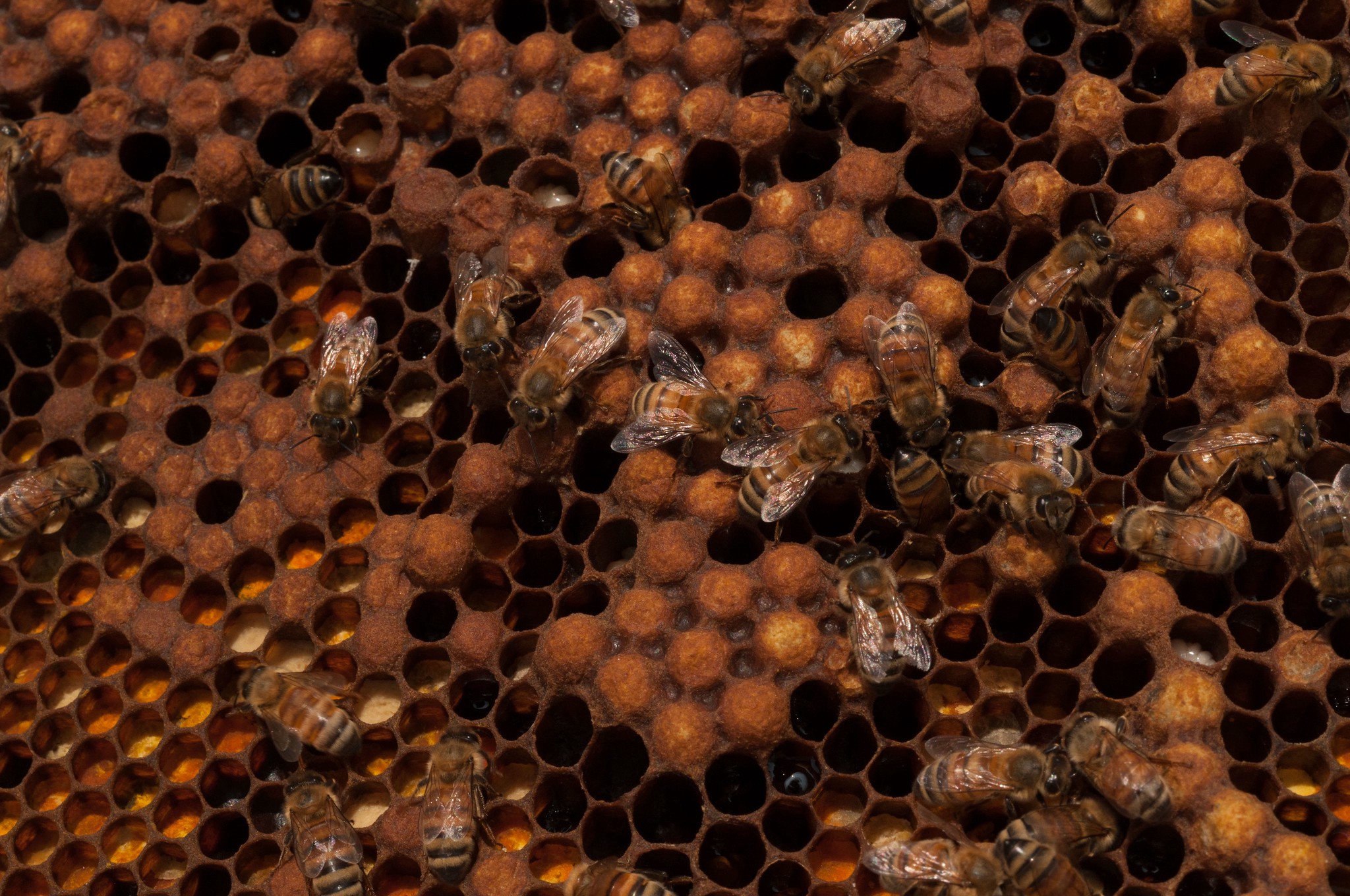 Honeybees at work, U.S. Department of Agriculture
Honeybees at work, U.S. Department of Agriculture
PETA, one of the most well-known vegan organizations in the U.S., calls honey ?dehydrated bee barf.? While this might be an effective gross-out tactic, it?s a bit histrionic. Worker bees fly around, storing the nectar they gather from flowers in a special honey sac separate from the stomach they use for digesting food, then carry it back to the hive. There, they regurgitate the nectar into house bees? mouths. These bees chew the nectar and pass it around before depositing it into the honeycomb, where it dries and becomes honey.
According to PETA, honey production involves beekeepers abusing bees as much as factory farming involves the abuse of livestock. They argue that many conventional beekeepers cut off the queen bee?s wings so she can?t leave the hive and artificially inseminate her on what PETA calls a ?rape rack.? Some beekeepers who can?t afford to keep their hives alive throughout the winter kill their bees using cyanide gas.
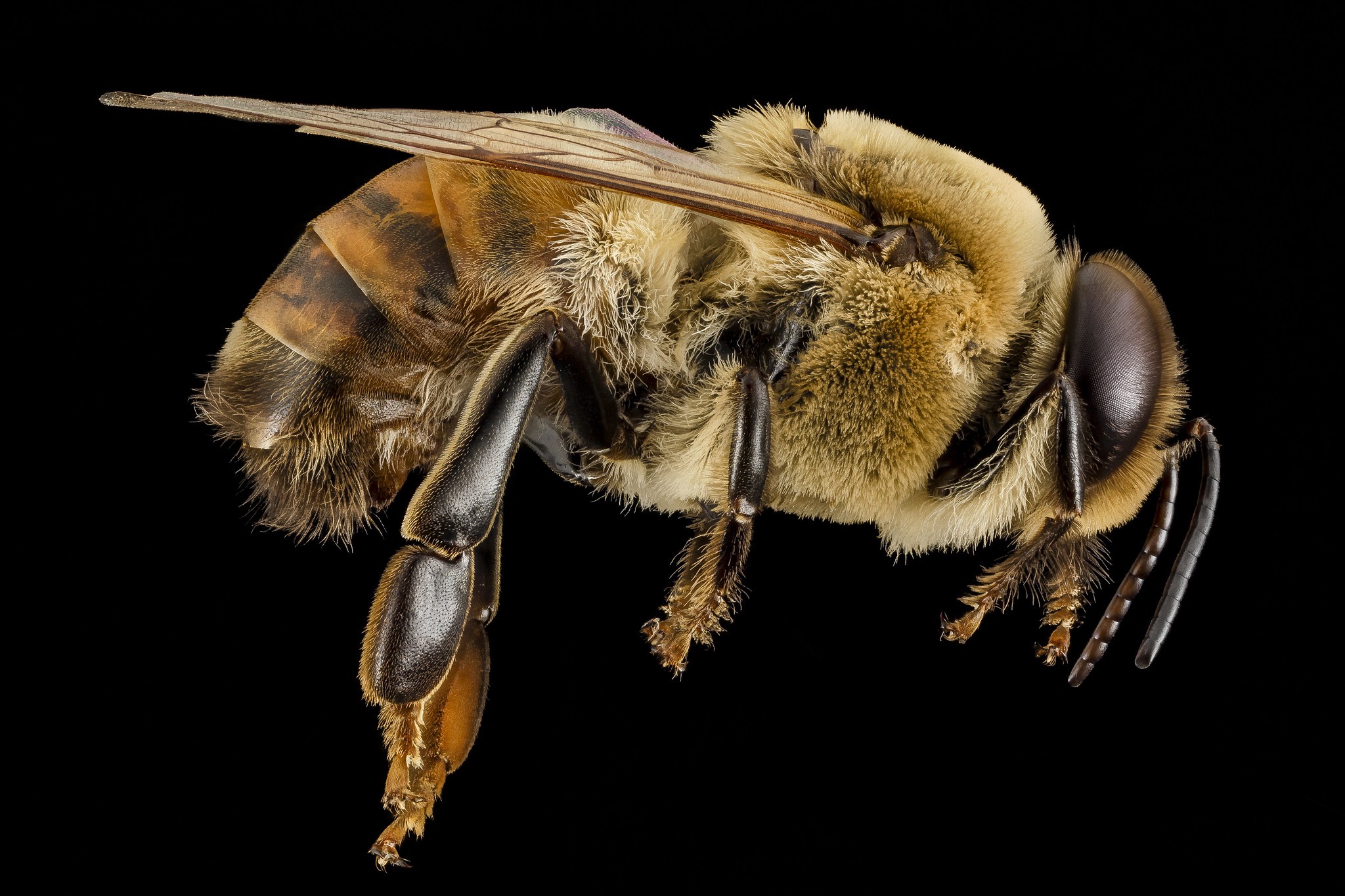 Male Honeybee Drone, U.S. Geological Survey
Male Honeybee Drone, U.S. Geological Survey
I interviewed Margaret Lombard, CEO of the National Honey Board and Kent Pegorsch, president of the Wisconsin Honey Producers Association to see what they had to say about PETA?s claims. Unsurprisingly, both disagree with this characterization of beekeepers. Pegorsch says the vast majority of beekeepers ?love their bees and treat their bees with respect and tender care.? Lombard denies that beekeepers mistreat bees, saying that ?keeping their hives healthy and alive is the number one goal of a beekeeper.?
?Artificial insemination is very rare,? Pegorsch says, and while it might be done by researchers, it ?really doesn?t have any benefit to a beekeeper? and ?would be far too expensive.? Bee Culture: The Magazine of American Beekeeping supports this, stating that ?large scale instrumental insemination never really caught on.? As far killing bees in the winter time, Pegorsch says, ?Of the thousands of beekeepers I know, I know of only two older beekeepers who keep a small number of hives, who still do this.?
Pegorsch also called wing clipping ?an antiquated practice.? However, in my research I came across beekeeping instructions many vegans would likely find upsetting. Arizona State University teaches beekeepers how to clip queen bees? wings and the University of Florida calls clipping the queen?s wings a ?a good way to minimize swarming tendencies,? which suggests the practice is still commonly used. Also, the University of Georgia?s Honey Bee Program page has instructions on how to ?kill and discard the old queen.?
The [Vegan Society] argument is simple: Bees create honey for themselves to eat in colder months, when there are fewer flowers and less pollen available for them. They can?t consent to share their honey with humans, which makes our honey use fundamentally unethical.
Though Lombard says it?s ?very unfair? to try and differentiate between local and industrial beekeepers in terms of ethics, the only way to be completely sure honey is produced using practices you feel comfortable with is to buy local honey and talk to the beekeeper yourself. According to Pegorsch, a benefit of buying local is ?you can judge the character of the beekeeper, and? ask questions and know where your honey comes from.? A beekeeper himself, Pegorsch says, ?I love talking to my customers about the honeybees I take care of.? Most local beekeepers using ethical practices will feel similarly.
?Ethical,? ?natural,? ?bee-centered,? ?sustainable,? ?regenerative,? and ?organic? are all terms used to describe the more bee-friendly types of beekeeping that seem to be rising in popularity. (Note that ?organic? isn?t an official certification at this point in time, although the USDA?s website states they?re in the process of developing standards to certify organic honey.) The different terms have slightly different meanings and none are officially regulated, but these phrases tend to signal that the bees are given more freedom and regard, and both the environment and the bees? welfare factor in more heavily. The only way to know exactly what methods are used, however, is to ask the beekeeper.
Ethical beekeeping practices aren?t enough to make honey ?officially? vegan according to most animal rights organizations. The Vegan Society, a large U.K. vegan organization, states that honey isn?t vegan because it?s inherently exploitative, even when its production doesn?t involve any specific cruelty to bees. Their argument is simple: Bees create honey for themselves to eat in colder months, when there are fewer flowers and less pollen available for them. They can?t consent to share their honey with humans, which makes our honey use fundamentally unethical.
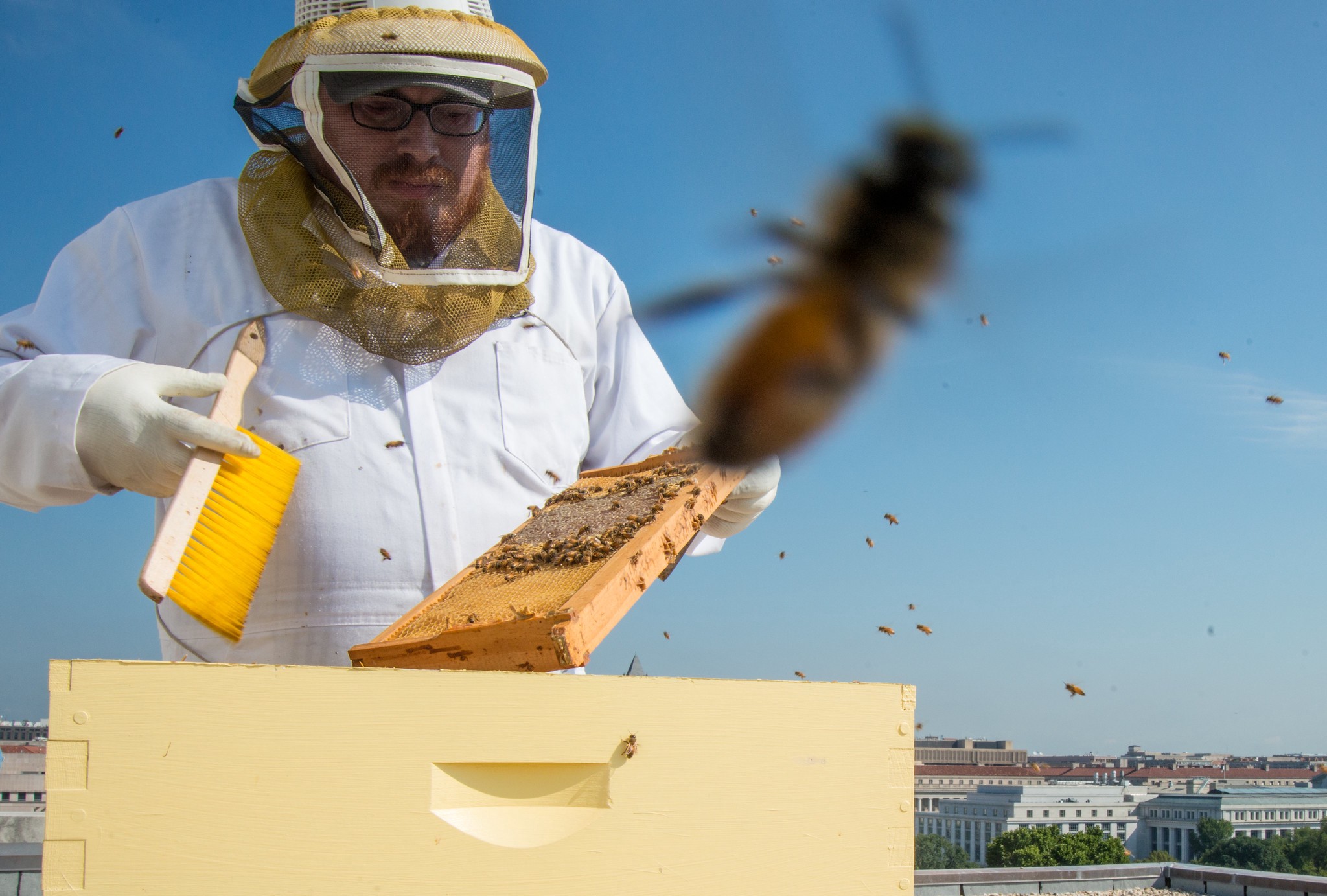 Beekeeper, U.S. Department of Agriculture
Beekeeper, U.S. Department of Agriculture
Famous plant-based physician and best-selling author Michael Greger, M.D. once argued that this hardline stance against honey ?is hurting [veganism] as a movement? because it?s illogical. He argues that if vegans consider insects animals, then all non-organic produce is also not vegan. ?Killing bugs is what pesticides do best,? Greger wrote.
?I am not sure what they [vegans] could eat if honeybees were not kept to pollinate their foods. Without the work of bees, there wouldn?t be a plant-based diet.?
I spoke with Terri Lechner, Director of Public Outreach for the Center for Honeybee Research in Asheville, North Carolina about this point. The Center is a non-profit organization working to save honeybees by conducting research and educating beekeepers and the public. Lechner is also a backyard beekeeper and has been vegetarian for 35 years. ?I would totally agree with that quote,? she said, regarding Dr. Greger?s opinion that outlawing honey hurts veganism. Lechner continued, ?I think if I were vegan and not willing to eat honey, then I would also not eat almonds.?
Pegorsch said something similar: ?I am not sure what they [vegans] could eat if honeybees were not kept to pollinate their foods.? Lombard also noted that ?without the work of bees, there wouldn?t be a plant-based diet.?
It turns out the honey question is even more complicated than I originally thought. Because of the massive decline in bees and other pollinators and the rise in unsustainable agriculture practices, thousands of honeybee hives are needed to travel the country, providing pollinating services for crops. According to the USDA, the top crops pollinated are almonds (which wouldn?t exist in the U.S. without pollination services), sunflowers, canola, grapes, and apples.
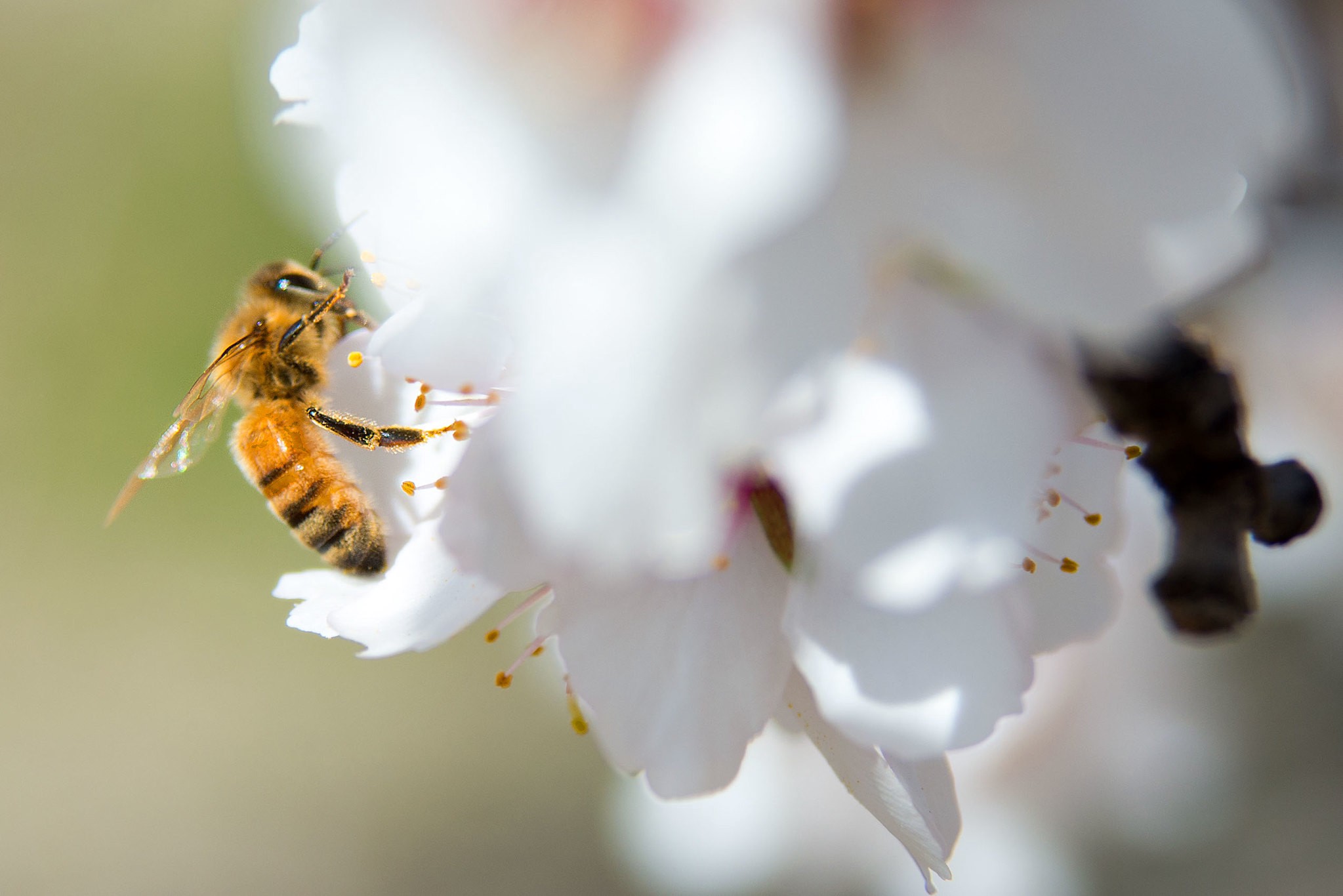 Honeybee pollinating, U.S. Department of Agriculture
Honeybee pollinating, U.S. Department of Agriculture
Migratory beekeepers are those who use bees for pollination in addition to or instead of honey production. They travel the country with 400?500 hives in trucks, strategically releasing the 10,000?30,000 worker bees in each hive to pollinate fields of mono-agriculture too vast to be handled by native pollinators. (If you want to learn more, the Beekeeping Today Podcast?s ?Pollinator Week? episodes and the 2019 documentary The Pollinators focus on them.)
Many researchers suspect migratory beekeeping disrupts hives and (in addition to pesticide use and other factors) plays a role in the declining honeybee population. Unfortunately, avoiding foods pollinated by migratory beekeeping is nearly impossible.
Just because there isn?t a simple way to consume food without harming insects doesn?t mean vegans have to give up trying. I refuse to submit to a logical fallacy (the ?nirvana fallacy?) that if you can?t do something perfectly you might as well not do it at all.
I?ve decided to hold off on honey temporarily, but will begin consuming it once I?ve settled on a local ethical beekeeper. (I don?t know that I?m ready to call myself a ?beegan,?a term some honey-eating vegans have given to themselves.) Instead of avoiding honey, I?ll dedicate more effort to avoiding conventional sugar and maple syrup, non-organic produce, and almond milk (almond milk is such a big part of my diet now, that hurts to type!).
Though honey will likely never be considered ?officially? vegan, I?ve learned that attempting to eat ethically, in a way that doesn?t harm animals, insects, or the environment, is a lot more complicated than following one simple set of rules. I?m up for the challenge.
